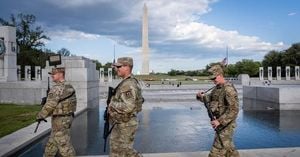For years, Palestinians living in the Israeli-occupied West Bank have navigated a landscape riddled with checkpoints and barriers. But in the wake of the October 7, 2023, Hamas attack on Israel, daily life has become even more challenging for these residents. The Israeli military, citing heightened security concerns, has erected hundreds of new gates across the West Bank, further tightening control over Palestinian movement and fueling a heated debate about the gates’ true purpose and impact.
“This is going to disrupt my life totally. Maybe I’ll be in Rawabi and I cannot get out. Suddenly, I’m in a prison,” said Khawla Nasr al-Din, a 45-year-old computer engineer from the upscale Palestinian town of Rawabi, as reported by NPR. Just two days before October 8, 2025, Israeli forces installed a massive yellow gate on the only road in and out of her town. The abrupt appearance of this barrier left her—and many others—questioning how they would manage ordinary tasks like shopping or caring for elderly family members if suddenly locked in or out.
Al-Din’s concerns are far from unique. Across the West Bank, the topic of these gates dominates radio drive-time discussions, features heavily on new traffic apps, and even inspires local artists. Palestinian rappers Fawzi and Shabjdeed have found their latest song—listing the names of closed gates and referencing the ever-present threat of violence—on heavy rotation. Their lyrics, laced with auto-tuned urgency, capture the mounting frustration and anxiety of a population increasingly hemmed in by physical barriers.
According to the United Nations’ Office for Humanitarian Affairs, there are now at least 306 such gates scattered throughout the West Bank. The Israeli military, however, declined to provide NPR with an exact count, maintaining that these installations are “vital security measures” designed to prevent attacks. Since October 2023, at least 58 Israelis have been killed by Palestinians in the West Bank and Israel, a statistic the military points to in justifying the expanded restrictions.
Yet, the toll on Palestinians has been far heavier. The U.N. reports that more than 1,000 Palestinians have died at the hands of Israeli forces, Jewish settlers, and other Israelis over the same period. The new gates, critics argue, have only deepened the sense of collective punishment and isolation felt by West Bank residents.
“They can decide whenever they want to close it without explaining, without doing anything, just closing it. And you never know when they come back. It can be half an hour. It can be also half a week,” said Dror Etkes, an Israeli activist who closely monitors land policy in the West Bank, as quoted by NPR. This unpredictability, he explains, puts daily life under the arbitrary control of the military, with closures sometimes lasting mere minutes and, at other times, stretching on for days.
Such uncertainty is not just an inconvenience; it’s a source of persistent anxiety. For many, the sudden closure of a gate can mean missing work, being unable to reach medical care, or facing separation from family members. The situation is especially acute in places like Rawabi and Eizariya, where recently erected yellow gates now block the only main roads connecting these towns to the rest of the region.
In Eizariya, a city that sits on the main route for a 30-minute drive to Jerusalem, the impact of a newly installed gate is palpable. Three weeks before October 8, 2025, Israeli forces erected a large yellow gate across the city’s primary road. Ala Rabaya, a father of four who works in construction at the expanding Jewish settlement of Ma’ale Adumim, described the feeling succinctly: “It’s hard when they close the gate. You really feel locked in two different worlds, one for Israelis, the other for Palestinians.”
The Israeli military maintains that any suggestion the gates are purposely intended to constrict Palestinian lives is “entirely unfounded.” In a statement provided to NPR, officials emphasized the security rationale behind the barriers, pointing to ongoing attacks and the need to protect Israeli citizens. But this explanation rings hollow for many Palestinians and their advocates, who see the gates as part of a broader strategy to fragment Palestinian society and undermine prospects for a future independent state.
Omar Awadallah, Deputy Minister of Foreign Affairs for the Palestinian Authority, did not mince words when speaking to NPR. He asserted, “They are trying to turn it into isolated communities. They want to take out the idea that there is people, a united one people living here.” Palestinian officials argue that the gates violate international law by restricting freedom of movement and effectively dividing the West Bank into disconnected enclaves.
The U.N.’s Office for Humanitarian Affairs, which tracks both Israeli and Palestinian casualties, has echoed concerns about the humanitarian impact of these restrictions. The office’s statistics—58 Israelis killed in attacks since October 2023, compared to over 1,000 Palestinians killed by Israeli forces, settlers, and others—underscore the asymmetry of violence and the heightened risks faced by Palestinians navigating the West Bank’s increasingly fragmented terrain.
For many ordinary Palestinians, the gates are more than just physical obstacles; they are daily reminders of a political and social reality that feels increasingly suffocating. The barriers disrupt work, education, healthcare, and family life, and have become a focal point for public frustration and creative expression alike. Whether through rap lyrics or the wail of ambulance sirens forced to take detours, the message is clear: life under lockdown is taking a toll.
Meanwhile, the Israeli government continues to insist that the gates are a necessary response to genuine security threats. The military’s refusal to provide specific numbers or timelines for gate closures only adds to the sense of unpredictability. For their part, Israeli activists like Dror Etkes warn that the power to close off entire communities “without explaining, without doing anything, just closing it” represents a troubling expansion of military authority over civilian life.
As the debate rages on, the lived experience of West Bank residents remains one of uncertainty and constraint. The gates—now numbering in the hundreds—have become symbols of a conflict that shows few signs of resolution. Whether viewed as security measures or instruments of control, their presence is reshaping the landscape of daily life in the West Bank, one closure at a time.
In the hills of Rawabi, the streets of Eizariya, and countless other towns across the territory, the question remains: how many more gates will go up before the path to peace becomes passable again?




